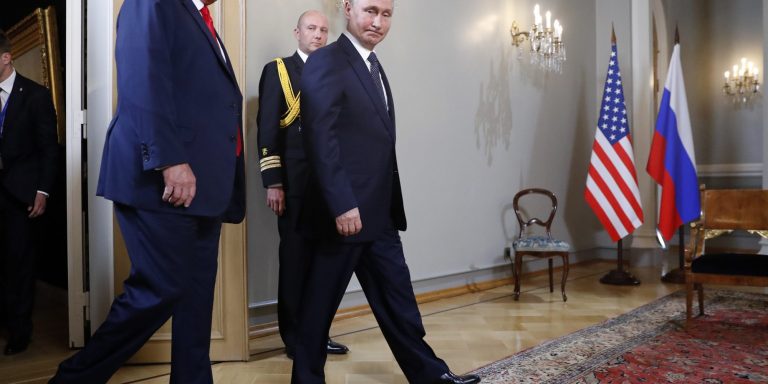INTELBRIEF
July 17, 2018
IntelBrief: A Summit Unlike Any Other

- On July 16, 2018, U.S. President Trump met with Russian President Putin in Helsinki.
- President Trump publicly sided with Russia over his own U.S. intelligence agencies regarding Russian election interference, saying that he personally saw ‘no reason why it should be’ Russia.
- President Putin claimed his goal is to work with the U.S. bilaterally, going around ‘maladjusted’ global structures.
- Post-conference news across the United States showed that even Trump’s most consistent supporters in Congress and in think tanks publicly criticized him.
.
Less than four days after U.S. Deputy Attorney General Rod Rosenstein announced federal indictments against 12 Russian intelligence officers, U.S. President Trump met with Russian President Putin in Helsinki. The indictments were for the named intelligence officers’ involvement in the stealing of databases and servers associated with the U.S. Democratic Party. Heading to the mini-summit, Trump did more than ignore the significant developments in the ongoing investigation into Russian interference in the U.S. 2016 elections: he blamed the bad blood between the countries on previous U.S. administrations, and dismissed the investigation into Russian election meddling as a ‘rigged witch hunt.’ Further, just before his meeting with Putin, Trump declared most of the press an ‘enemy of the people’—a truly remarkable statement.
At the beginning of the mini-summit, at the request of President Trump, the two men met for 2 hours without any staff; only their respective translators were in the room. After the one-on-one meeting, Trump and Putin held a brief press conference during which President Putin spoke of strengthening U.S.-Russian bilateral relations that would take the lead in reforming ‘maladjusted’ global organizations (such as the U.N. and NATO) that stand in the way of the two addressing mutual challenges. The statement was an open declaration of Russia’s long-standing desire to splinter the West’s unity against Russian aggressions.
Regarding Russian interference in the 2016 U.S. elections, President Trump took nothing close to a hardline on the matter, stating simply that he brought up the issue with Putin who strongly denied Russia’s involvement. In an earlier interview, Trump went so far as to blame the Democratic National Committee for the whole affair, saying it was their fault for ‘allowing themselves to be hacked.’ During his statement, Putin flatly denied the allegations but suggested that the two countries could examine the evidence the U.S. has together, with Russia being allowed to interview U.S. intelligence persons—a spectacular request. However, when asked after the press conference by a reporter if he wanted Trump to win the election, and if he directed any of his officials to ‘help him do that,’ Putin replied ‘Yes, I did.’
Trump opened his public remarks in Helsinki by saying he was continuing the ‘tradition of bold diplomacy’ demonstrated by U.S. leaders—necessary as the current relations between the two countries were ‘the worst’ in history. ‘All that changed four hours ago,’ he advised, however, when the two leaders met. This type of remark is yet another example of the intense personalization of U.S. foreign policy by President Trump, in which U.S. policies hinge on the personal feelings of the president about his foreign counterparts. As with the meeting with North Korean leader Kim Jung Un, President Trump proclaimed immediate success with respect to long-standing and complicated issues.
In what was certainly an unprecedented press conference for a U.S. president overseas—let alone standing next to the Russian president—President Trump refused to cite a single Russian action that has led to what he called ‘the worst tensions’ between Moscow and Washington. In a tweet just before the conference, Trump blamed ‘many years of U.S. foolishness and stupidity’ for the state of relations between Russia and the U.S. When directly asked by a reporter if he held Russia accountable for any of its actions leading to the issues between the two countries, President Trump said ‘we are all to blame’ but again cited U.S. ‘foolishness’ and the Mueller probe into Russian electoral interference and cyber theft as responsible for the current tensions—while putting no blame on Russia for any geopolitical issues for which the international community has condemned Russia. President Trump said that while his own intelligence agencies said that Russia had interfered in the 2016 election, he personally saw ‘no reason why it should be’ Russia and added that ‘President Putin was extremely strong and powerful in his denial today.’
It is difficult to place the spectacle of the Helsinki press conference into historical context as there is nothing remotely similar in U.S. history. In the same week that he categorized the European Union (E.U.) as a ‘foe’ of the United States (listing the E.U. ahead of Russia and China in terms of being U.S. foes)—prompting German Foreign Minister Heiko Maas to state in an interview with the Funkenewspaper that Europe can no longer fully rely on the White House—the U.S. president stood next to Russian president Putin and essentially said he believed Putin’s denial that Russia interfered with the 2016 election over the assessment of the U.S. intelligence community and Congressional investigations, as well as the more than two dozen federal indictments of Russian nationals by the ongoing Mueller investigation. That statement is staggering. President Trump’s remarks in the post-summit press conference—and the sentiments and beliefs that drove those remarks—are far beyond the norms for a U.S. president, even one as provocative as President Trump. The news across the United States showed that even Trump’s most consistent supporters in Congress and in think tanks publicly criticized him, a rare occurrence for a president that enjoys nearly 90% approval from members of his Republican party.
.
For tailored research and analysis, please contact: info@thesoufancenter.org
[video width="960" height="540" mp4="https://thesoufancenter.org/wp-content/uploads/2018/07/IB-0717.mp4" poster="https://thesoufancenter.org/wp-content/uploads/2018/07/AP_18197431442790-1-e1531769764190.jpg"][/video]